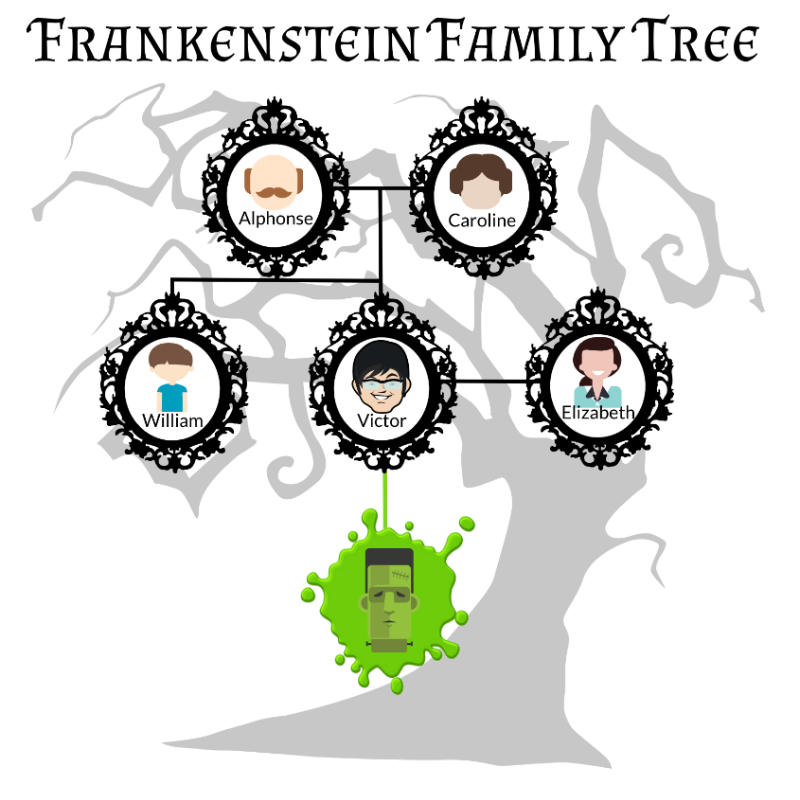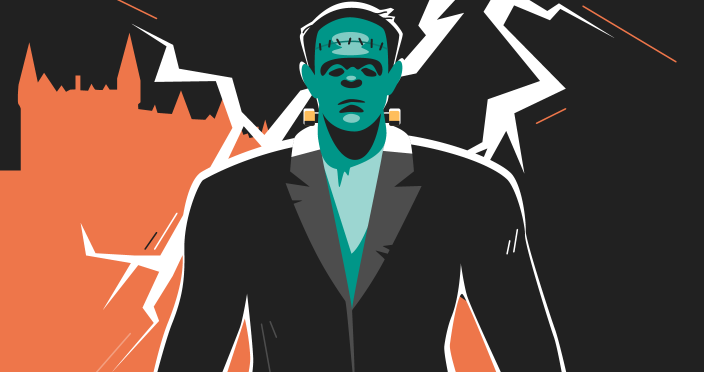Frankenstein themes explore timeless issues of human nature, scientific ambition, merciless revenge, and the responsibility that comes with knowledge. Written more than 200 years ago, the novel is still relevant today due to the topics it focuses on.
This article covers the major themes in Frankenstein by Mary Shelley, including fate vs. free will, nature, family, loneliness, revenge, love, science, and gender. It also contains Frankenstein family tree that illustrates the theme of family and its role in shaping one’s identity.
🗝️ Key Themes in Frankenstein
The key themes in Frankenstein by Mary Shelley are: fate & free will, nature, family & affection, loneliness & isolation, revenge, love, exploration & science, women & feminism.
⏳ Fate vs. Free Will
Fate in Frankenstein

The conflict between fate and free will holds a special place in literature. Fate, in Frankenstein, catalyzes many characters’ actions and decisions, whether it be Victor’s fate to create a beast or Frankenstein’s Monster’s fate to become a murderer. The characters tend to blame destiny for all the sad consequences of their bad deeds.
Fate and Free Will in Literature
Fate is known as the development of events in a way predestined by a supernatural power. The meaning of the term “free will” suggests that a man is capable of influencing events by taking responsibility for his actions.
Throughout the novel, the theme of destiny and man’s will runs like a golden thread between other Frankenstein themes. Although characters like Victor Frankenstein and Robert Walton are described as ambitious and goal-oriented, their decisions seem to be predetermined by the power of fate. Both characters crave fame and glory, and both take conscious steps towards achieving their goals – Walton arranges the journey towards the North Pole, and Victor delves himself into the study of natural sciences. However, they still attribute these actions to Heaven’s demand rather than to their own will.
There is no actual confrontation between fate and free will in Frankenstein’s reasoning, as he willingly bows to the rule of destiny. There are many fate quotes in the novel supporting this statement. When Mr. Waldman inspires Victor to continue his studies, he attributes the professor’s words to “the words of the fate – enounced to destroy [him].” When the Monster, the result of his endeavors, kills his entire family, Victor again refuses to hold himself responsible and blames the destiny, “I, a miserable wretch, haunted by a curse that shut up every avenue to enjoyment.”
In literature, the tendency to rely on fate originates in Greek philosophy. One can recall Sophocles’s Oedipus, who was destined to murder his father and marry his mother, or Homer’s Achilles, who, from his youth, was blessed by the Gods to become the hero of Troy. However, heroes of Greek myths knew their fate and tried to avoid it, while Frankenstein’s characters first take actions, and later blame Heavens for their failures.
The only character who tries to resist his fate is the Monster. From the first minutes of his life, he was doomed to face rejection. His destiny, though, was shaped not by Gods but by a man, his creator. The Monster confronts his fate and decides to avenge the man for his misfortunes. “Yet mine shall not be the submission of abject slavery. I will revenge my injuries,” he resolves.
Fate: Quotes from Frankenstein
The God of heaven forgive me! Ever since I was condemned, my confessor has besieged me; he threatened and menaced, until I almost began to think that I was the monster that he said I was. He threatened excommunication and hell fire in my last moments if I continued obdurate.
Frankenstein, Justine Moritz, Chapter 8
I was formed for peaceful happiness. During my youthful days discontent never visited my mind… But I am a blasted tree; the bolt has entered my soul; and I felt then that I should survive to exhibit what I shall soon cease to be–a miserable spectacle of wrecked humanity, pitiable to others and intolerable to myself.
Frankenstein, Victor Frankenstein, Chapter 19
How all this will terminate, I know not, but I had rather die than return shamefully, my purpose unfulfilled. Yet I fear such will be my fate; the men, unsupported by ideas of glory and honour, can never willingly continue to endure their present hardships.
Frankenstein, Robert Walton, Chapter 24
🐝 Nature
Nature in Frankenstein

Mary Shelley pictures nature in Frankenstein as beautiful and majestic but frightening and omnipotent at the same time. Victor and the creature find peace and consolation in nature in the moments of despair. When Frankenstein defies its laws by creating the Monster, nature punishes him. It no longer serves as the source of comfort but turns into an intimidating providence.
Romanticism & Nature
During the period of Romanticism, nature became one of the key themes in literature. As many examples of literary works demonstrate, appeal to the natural world was a response to the scientific progress and industrial revolution. Writers pictured nature not only as a healing source but also as a sublime and frightening power that prevailed over human capabilities.
Nature Theme in Literature
The nature theme has always been essential for poets and writers. In the Era of Romanticism, it became especially evident. Romantic writers treated nature not so much as a passive background against which events unfold, but more as a character on its own. They believed the beauty of nature was able to restore strength and influence emotions as well as to be a harbinger of tragedies. Romantics invariably equated nature with God, attributing magical powers to it.
Among authors of the Romantic period who worshiped nature, was Lord Byron, a famous poet and a close friend of Mary Shelley. In Childe Harold’s Pilgrimage, he wrote,
There is a pleasure in the pathless woods,
Childe Harold, Narrator, Canto the Fourth, Stanza CLXXVIII
There is a rapture on the lonely shore,
There is society, where none intrudes,
By the deep sea, and music in its roar:
I love not man the less, but nature more.
For Mary Shelley, the nature theme, among other themes in Frankenstein, serves as a key instrument to explore characters’ personalities. Her characters repeatedly turn to nature in search of solace and relief. For them, turning to nature was akin to returning home, to the Mother of all living things, to the roots. Having created a living creature from inanimate matter, Victor thereby betrayed Mother nature and paid a high price for it. His creature assembled from dead pieces is, by definition, a product of an unnatural process.
Through the Monster’s character, Mary Shelley addresses the everlasting debate: Nature vs. Nurture, and answers the question – whether one enters the world a villain or he gradually turns into one due to surrounding circumstances? The creature’s life story demonstrates that although born without biological parents to inherit either good or bad genes from, he was benevolent and innocent at heart. It was the cruel treatment of people that made him a beast.
Frankenstein: Nature Quotes
Even broken in spirit as he is, no one can feel more deeply than he does the beauties of nature. The starry sky, the sea, and every sight afforded by these wonderful regions seem still to have the power of elevating his soul from earth.
Frankenstein, Robert Walton, Letter 4
Spring advanced rapidly; the weather became fine and the skies cloudless… My senses were gratified and refreshed by a thousand scents of delight and a thousand sights of beauty.
Frankenstein, Monster, Chapter 13
Tears streamed from my eyes. The rain had ceased for a moment, and I saw the fish play in the waters as they had done a few hours before; they had then been observed by Elizabeth. Nothing is so painful to the human mind as a great and sudden change. The sun might shine or the clouds might lower, but nothing could appear to me as it had done the day before.
Frankenstein, Victor Frankenstein, Chapter 23
👩❤️👨 Family & Affection
Family in Frankenstein

In Frankenstein, the family theme is prominent. Throughout history, it has been playing an essential role in the development of a person. Using the example of Alphonse, Victor’s father, and his household, Mary Shelley shows how vital it is to have a healthy family relationship. Meanwhile, the Monster’s story illustrates how destructive the absence of such bonds can be.
Frankenstein Family Tree

Family Theme in Literature
There is no bigger influence on the way a human being is developed than that of his family. Intimate bonds with parents, or in some cases, the absence thereof, make people who they are. A man can never experience emotional intimacy to the full extent if his upbringing lacks the closeness of family ties.
Literary works of all times touched on a theme of family relationships. Starting with ancient Greek myths, one can trace how the attitude towards the family concept developed in different periods of human history.
The Greek tragedian, Sophocles, in stories about Oedipus, addresses family themes by making one of his characters, Antigone, to risk everything to ensure her brother’s proper burial. Antigone is willing to disobey the king because she values the memory of her brother higher than the ruler’s order.
In books of the 16-17th centuries, the compliance of children with parents’ wishes was equivalent to humanity’s obedience to God. For a child to disobey a parent would almost mean to condemn himself to death. This attitude was dictated by the tremendous influence of religion on people’s lives at that time, and examples of such views on the family institution can be found in Shakespeare’s Romeo and Juliet and Hamlet.
Similarly, the famous English novelist, Jane Austen, in her Pride and Prejudice, pictures a family as an unbreakable unit where obligations of parents and children before each other are established in a strict way.
In Frankenstein, themes of family bonds and affection are addressed through the author’s focus on the responsibility that a parent, or a creator, holds before his child. While Victor’s parents raised him in love and did everything to ensure his happiness, Frankenstein failed to hold himself accountable for the creature he gave life to. The Monster entered the world, having no idea what good and bad was. He had no one to take care of him or set an example for him. Thus, the reader hesitates to blame the Monster for all the terrible tragedies he caused. It was not his evil soul that pushed him towards murdering people, but the lack of family bonds that he longed for so desperately.
Family: Quotes from Frankenstein
I remained for several years their only child. Much as they were attached to each other, they seemed to draw inexhaustible stores of affection from a very mine of love to bestow them upon me… I was their plaything and their idol, and something better–their child…
Frankenstein, Victor Frankenstein, Chapter 1
Get well–and return to us. You will find a happy, cheerful home and friends who love you dearly.
Frankenstein, Elizabeth Lavenza, Chapter 6
Do you think, Victor,.. that I do not suffer also? No one could love a child more than I loved your brother,.. but is it not a duty to the survivors that we should refrain from augmenting their unhappiness by an appearance of immoderate grief? It is also a duty owed to yourself, for excessive sorrow prevents improvement or enjoyment, or even the discharge of daily usefulness, without which no man is fit for society.
Frankenstein, Alphonse Frankenstein, Chapter 9
🐺 Loneliness & Isolation
Loneliness in Frankenstein

The theme of loneliness in Frankenstein is first addressed through Walton’s complaints to his sister about not having a friend to share joys and sorrows of his journey. Later, all characters of the novel experience loneliness in one or the other way, but it is mostly evident in the examples of Victor and the Monster.
Isolation in Frankenstein
Isolation in Frankenstein is represented through the two main characters, Victor and the Monster. Many articles on the topic suggest that although the reasons for the characters’ alienation from the world are differently (in the context of Victor’s story, it is a self-made choice, for the creature – it is a forced circumstance), the consequences are equally destructive for both.
Loneliness & Isolation in Literature
Starting from the Biblical story of Adam and Eve exiled from Heaven, the theme of isolation, and therefore, loneliness, found its reflection in many literary works. The Era of Romanticism made the theme even more prominent. The literature of that period often used social alienation, among other effects, to explore the characters’ strengths and limitations.
Among novels in which the theme of loneliness serves as a critical factor for shaping characters’ personalities is Charlotte Bronte’s Jane Eyre. Jane’s social alienation is mainly connected with her “physical inferiority.” Because of her “pale and timid” look, she feels like an outcast. Moreover, she is an orphan, and her aunt mistreats her making Jane’s isolation even more distinct. In this regard, Jane is very similar to Mary Shelley’s Monster, who also experiences social rejection due to his ugly appearance and cruel treatment of people.
Another author for whom loneliness and isolation were the prime themes to explore human’s emotional anguish was Edgar Allan Poe. Like Victor in Frankenstein, the narrator of Poe’s Raven intentionally isolates himself from the world and gets driven into a total madness by depression and loneliness.
In Frankenstein, the Monster openly states that he would not turn into a beast if it were not for the rejection he faced on the part of his creator and people in general. He is the one who seeks compassion and interaction. His isolation is not his choice, but the decision of Victor who gave him life and later abandoned. Frankenstein, on the other hand, sought inspiration in estrangement from society. He dreamed of becoming something bigger than just a good husband or a trustworthy friend. He wanted to become God. This resulted in a tragedy that left him alone in the entire world.
Pondering over Frankenstein’s themes, one might notice that Mary Shelley often refers to Coleridge’s poem The Rime of the Ancient Mariner. Both, the mariner and Victor Frankenstein, indirectly caused the death of people that were dear to them and had to live in repentance for their deeds. Considering this, one can conclude that self-inflicted isolation can simultaneously be the major cause of evil and the punishment for it.
Loneliness: Quotes from Frankenstein
In a solitary chamber, or rather cell, at the top of the house, and separated from all the other apartments by a gallery and staircase, I kept my workshop of filthy creation; my eyeballs were starting from their sockets in attending to the details of my employment.
Frankenstein, Victor Frankenstein, Chapter 4
Believe me, Frankenstein, I was benevolent; my soul glowed with love and humanity; but am I not alone, miserably alone? You, my creator, abhor me; what hope can I gather from your fellow creatures, who owe me nothing? They spurn and hate me. The desert mountains and dreary glaciers are my refuge.
Frankenstein, Monster, Chapter 10
Yet he enjoys one comfort, the offspring of solitude and delirium; he believes that when in dreams he holds converse with his friends and derives from that communion consolation for his miseries or excitements to his vengeance, that they are not the creations of his fancy, but the beings themselves who visit him from the regions of a remote world.
Frankenstein, Robert Walton, Chapter 24
💣 Revenge
Revenge in Frankenstein

Revenge is a key theme in Frankenstein. It is most evident in the examples of Victor and the Monster. The creature, rejected by humanity and abandoned by his creator, seeks justice and swears to avenge Victor, which in turn, provokes the revenge of Frankenstein. The vicious circle of revenge brings both to the tragic end.
Theme of Revenge in Literature
Mary Shelley was not the first novelist to address the theme of revenge in her book. The desire of vengeance, an exceptionally strong human emotion which sometimes overcomes common sense, exited authors from Ancient times.
Revenge in the literature of Ancient Greece was used as a substitute for justice. Greeks believed that one who suffered a loss had a full right to punish the wrongdoers according to their crimes. An excellent example of Ancient literature that has a theme of revenge as the main plot idea is Euripides’s Medea. Medea’s husband left her for another woman, and she decides to avenge him by killing their children.
During the period of the late Renaissance, blood vengeance was considered a norm almost at the state level. The genre called ‘revenge tragedy’ became very popular at this time. Most revenge-plays pictured a character who, when faced with the duty of avenging a relative, chooses either to take actions and kill the offender or to rely on divine justice. Shakespeare, in Hamlet, explored the theme even more in-depth, making his character doubt the fairness of the “measure for measure” approach.
The Gothic stories often used the theme of vengeance as a centerpiece of the plot. For example, the storyline of the gothic novel, Zastrozzi, written by Percy Bysshe Shelley, is all about a man driven by revenge against his father and brother.
Although retaliation serves as one of the most prominent themes in Frankenstein, Mary Shelley does not justify revenge. She clearly illustrates that vengeance is a destructive power. Both main characters made avenging each other the primary purpose of their lives. The Monster, when he lost his hope to be accepted by humanity, declared “…everlasting war against the species, and more than all, against him who had formed [him] and sent [him] forth to this insupportable misery.”
When his relatives were dead, Frankenstein, instead of trying to understand the Monster’s motivation and accept his own responsibility before the creature, turned to revenge as well. His hatred was so overwhelming it became the only thing that “kept [him] alive.”
Hatred can only bring more hatred, and as Mary Shelley demonstrates it in the novel, both characters caused the death of many people and drove themselves to the most miserable end.
Revenge: Quotes from Frankenstein
When I reflected on his crimes and malice, my hatred and revenge burst all bounds of moderation. I would have made a pilgrimage to the highest peak of the Andes, could I when there have precipitated him to their base.
Frankenstein, Victor Frankenstein, Chapter 9
Cursed, cursed creator! Why did I live? Why, in that instant, did I not extinguish the spark of existence which you had so wantonly bestowed? I know not; despair had not yet taken possession of me; my feelings were those of rage and revenge.
Frankenstein, Monster, Chapter 16
“I WILL BE WITH YOU ON YOUR WEDDING-NIGHT!” Such was my sentence, and on that night would the daemon employ every art to destroy me and tear me from the glimpse of happiness which promised partly to console my sufferings.
Frankenstein, Victor Frankenstein, Chapter 22
💌 Love
Frankenstein: Love Theme

Love in Frankenstein serves as the key mechanism motivating characters to do what they do. At the beginning of the story, the love of nature pushes Victor to study science. The Monster turns into a murderer because his need for love was never satisfied. Frankenstein’s love for his family forces him to seek revenge and results in a tragic ending.
Love & Marriage in Literature
Love is a universal theme in literature, as it is the most multifaceted of all human emotions. It inspires people to make discoveries and sacrifices, as well as to commit the most terrible acts. Throughout centuries, authors have addressed the theme of love, pondering over all of its manifestations.
Shakespeare often touched on the topic of forbidden love. In Romeo and Juliet, he illustrated what can happen when the families’ feud confronts the mutual love of two beings.
Among other manifestations of love, often described in the literature, is the love of the family. Faulkner in The Sound and the Fury and Salinger in The Catcher in the Rye explored love themes through the prism of family relationships.
Most often, novelists explore the theme of unrequited love, which can be both sacrificial and destructive. George Eliot (Mary Ann Evans), in her Middlemarch, pictures a character, Mr. Farebrother, whose unreciprocated love makes him sacrifice his desires for the happiness of the woman he loves. On the other hand, Goethe in The Sorrows of Young Werther shows that one-sided love can push the character to commit suicide.
In Frankenstein, the theme of love is present in all its manifestations. If we are to talk about love and marriage, we have the ideal relationship of Victor’s parents presented to us. Their love for each other is exemplary. It is full of care and compassion. Similarly, the love of DeLaceys for each other seems to have no boundaries. Frankenstein also had a chance to form a perfect union with Elizabeth if his love for her were more significant than his pride, which indirectly caused her death.
The monster in the novel is the only character whose love is unrequited. At birth, he is abandoned by his creator, and his sincere love for the DeLacey family and for the humans, in general, met rejection. The absence of compassion in his life is a key to understanding the creature’s motivations, as it made him a murderer. It is evident that although the theme of love is not the most obvious one among other Frankenstein themes, it still serves as the major background for analyzing the events of the novel.
Love: Quotes from Frankenstein
He came like a protecting spirit to the poor girl, who committed herself to his care; and after the interment of his friend he conducted her to Geneva and placed her under the protection of a relation. Two years after this event Caroline became his wife.
Frankenstein, Victor Frankenstein, Chapter 1
You must create a female for me with whom I can live in the interchange of those sympathies necessary for my being. This you alone can do, and I demand it of you as a right which you must not refuse to concede.
Frankenstein, Monster, Chapter 17
I confess to you, my friend, that I love you and that in my airy dreams of futurity you have been my constant friend and companion. But it is your happiness I desire as well as my own when I declare to you that our marriage would render me eternally miserable unless it were the dictate of your own free choice.
Frankenstein, Elizabeth Lavenza, Chapter 22
🔍 Exploration & Science
Science in Frankenstein

Mary Shelley wrote Frankenstein in the early 19th century when all of Europe enthusiastically discussed scientific discoveries and achievements. The Scientific Revolution not only gave food for reflection to the authors but even led to the emergence of a new genre in literature – science fiction. Writers like Jane Webb Loudon, E.T.A. Hoffmann, and Jules Verne, armed with existing knowledge about technologies, journeys, and explorations, created unrealistic worlds and characters endowed with inhuman abilities.
Frankenstein was also a response to the achievements of the Scientific Revolution. The main character of the novel assembles a creature from dead pieces and then manages to breathe life into it. Although the idea of reanimating corpses may seem absurd to the modern readers, it did not appear as such at Mary Shelley’s time. From the mid-18th century, scientists were obsessed with the concept of electricity. The world was excited about Galvani and Volta’s “frog experiments.”
In 1803, Galvani’s nephew, Aldini, conducted his first public experiment on the executed prisoner, Foster, causing his dead body’s muscles to contract in terrible grimaces with the help of electricity. The analysis of the experiment’s results gave people a reason to believe that reviving corpses were no longer a miracle. Mary Shelly knew about these experiments since Aldini, Galvani, and Volta were friends of her father. In this context, the idea of a living monster created from a dead matter seemed quite natural.
However, creating Frankenstein, Mary Shelley did not intend to write an entertaining story about a living corpse. On the contrary, taking a scientific experiment as a plot basis, she aimed at raising the philosophical question of the responsibility of scientists before society. Frankenstein illustrates that scientific experiments conducted without concern about consequences can bring humanity to a tragic end.
Victor Frankenstein is a perfect example of a scientist who carried out his experiments just for the sake of gaining power and fame without thinking much about the outcome. Among many Frankenstein’s quotes about science, there is one, where Victor boldly states, “A new species would bless me as its creator and source; many happy and excellent natures would owe their being to me. No father could claim the gratitude of his child so completely as I should deserve theirs. “Giving life to the Monster, Frankenstein failed to hold himself accountable for the being he created. As a result, many people died, and Victor was forced to spend the rest of his short life in hatred and remorse.
Frankenstein: Quotes about Science
I have described myself as always having been imbued with a fervent longing to penetrate the secrets of nature. In spite of the intense labour and wonderful discoveries of modern philosophers, I always came from my studies discontented and unsatisfied.
Frankenstein, Victor Frankenstein, Chapter 2
Through this work I obtained a cursory knowledge of history and a view of the several empires at present existing in the world; it gave me an insight into the manners, governments, and religions of the different nations of the earth.
Frankenstein, Monster, Chapter 13
One of the phenomena which had peculiarly attracted my attention was the structure of the human frame, and, indeed, any animal endued with life. Whence, I often asked myself, did the principle of life proceed? It was a bold question, and one which has ever been considered as a mystery…
Frankenstein, Victor Frankenstein, Chapter 4
👯 Women in Frankenstein

Many see Shelley’s masterpiece as a male-centered novel. Women in Frankenstein play roles of submissive, will-less creatures, whose main priority is to be good mothers and caring wives. It is not a coincidence that all descriptions of female characters are given through the male’s narration. The author makes the reader see Elizabeth, Caroline, and Justine the way Victor Frankenstein sees them, and to perceive Safie and Agatha through the eyes of the Monster. Shelley deliberately deprives women of their own voice to emphasize various problems that the male-dominated society holds.
The most active female character of the novel, Elizabeth, already at the beginning of the book, is introduced to the reader as Victor’s possession. From the moment she appears in the family, it is predetermined for her to become Frankenstein’s wife. Victor, as a little boy, speaks of her, “till death she was to be mine only.”
Although it is clear that Victor treats Elizabeth with adoration, he still diminishes her value by predisposing her entire existence to one purpose – be his possession. Victor’s condescension towards Elizabeth becomes obvious when he speaks of her as of a pet, “She was docile and good-tempered, yet gay and playful as a summer’s insect… I loved to tend on her, as I should on a favorite animal…”
Victor’s mother, Caroline, is also pictured as a character with no rights whose life is determined by the men surrounding her. First, her fate was in the hands of her father, who, for the sake of his pride, exposed her to poverty and hard work. Then she came under the patronage of her husband. While Alphonse treated her with love and care, Caroline’s role was still boiled down to raising children and being a subordinate wife.
Another female character, Justine, suffers the even worse fate of a right-less female. She is accused of a crime committed by the male and executed for it having nobody to protect her. Even in the last moments of her life, she was forced by a man (a priest) to confess to the murder.
The only character that remotely reflects the ideas of feminism in Frankenstein is Safie. She is pictured as a brave and independent woman, who dared to disobey not only her father but the entire Turkish patriarchal tradition. However, even for Safie, the dream to become a part of the society “where women were allowed to take a rank” comes with the price. She would not be able to do it on her own, but only through a marriage with a Christian man.
It is widely accepted that for the book to be considered feminist, it must include a strong female lead character who would represent the ideals of independence and equality. From this perspective, Frankenstein is not a feminist novel. However, a total absence of such character and a strong emphasis on picturing the flaws of predominantly male society, is precisely what makes this book very feminist.
